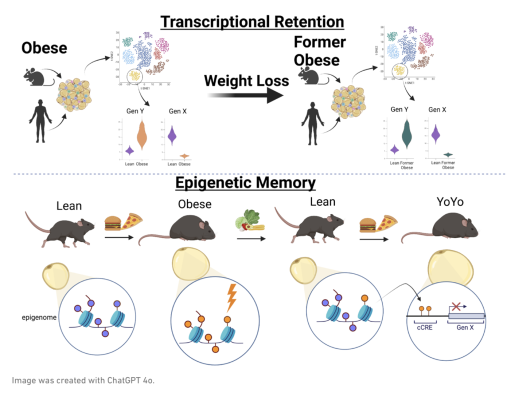
https://www.nature.com/articles/s41586-024-08165-7#Fig5
Adipose tissue retains an epigenetic memory of obesity after weight loss. Reducing body weight to improve metabolic health and related commorbidities is a primary goal in treating obesity. However, maintening weight loss is a considerable challenge, especially as the body seems to retain an obsegenic memory that defends agaisnt body weight changes. Persistent obesiity- induced alterations were found in the epigenome of mouse adipocytes that negatively affect their function and response to metabolic stimuli. Mice carring this obesogenic memory show accelerated rebound weight pain, and the epigenetic memory can explain future transcriptional deregulation in adipocytes in response to further high-fat diet feeding. In summary, the existence of an obsegenic memory was found largely on the basis of stable epigenetic changes, in mouse adipocytes. These changes seem to explain the problematic "Yo-Yo" effect often seen in dieting. Targeting these changes in the future could improve long-term weight management and health outcomes. 11/24
https://www.tandfonline.com/doi/abs/10.2217/epi-2021-0310?journalCode=epi
https://www.youtube.com/watch?v=MD3Fc0XOjWk
Survivors of the Rwandan genocide keep scars of trauma in their genome. The 1994 Tutsi genocide resulted in the deaths of around 1 million people in 100 days. An American-Rwandan team studied the epigenome of two groups of Tutsi women: one group of women exposed to the terror of the genocide, and another group of women who had lived abroad (and therefore had not directly experienced the genocide). In the women exposed to the terror, high levels of DNA methylation were observed. In addition, these DNA changes were passed on to their children, who were fetuses at the time of the genocide. According to the authors, this may explain why, decades later, there is a high incidence of mental disorders in Rwanda.
Les survivants du génocide rwandais porte dans leur génome les traces du traumatisme. Le génocide des tutsis de 1994 a conduit à la mort d'environ 1 million de personnes en 100 jours. Une équipe américano-rwandaise a étudié l'épigénome de deux groupes de femmes Tutsi: un groupe de femmes exposées à la terreur du génocide et un autre groupe de femmes qui ont vécu à l'étranger (et qui n'ont donc pas subi directement le génocide). Chez les femmes exposées à la terreur, une méthylation élevée de l'ADN a été relevée. Ces modifications chimiques de l'ADN ont été transmises chez leurs enfants, qui étaient foetus au moment du génocide. Selon les auteurs, cela pourrait expliquer en partie pourquoi, au Rwanda des décennies plus tard, on compte un grand nombre de troubles de la santé mentale. 12/21

